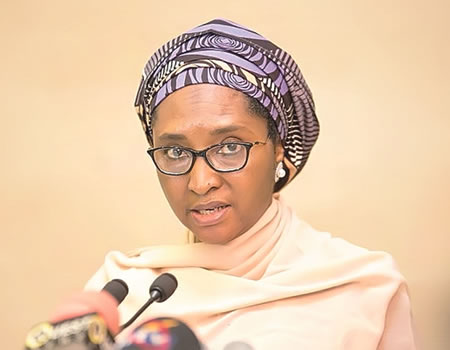The Federal Government, on Wednesday, disclosed that it has expended the sum of N4.45trn out of the total sum of N9.97 trillion appropriated for 2020 fiscal year, out of which the sums of N1.57 trillion for debt servicing and N1.61 trillion expended on personnel and pensions.
The Minister of Finance, Budget and National Planning, Mrs Zainab Ahmed, stated this during the presentation of the 2021-2023 Medium-term Expenditure Framework (MTEF) and Fiscal Strategy Paper (FSP) to the joint House of Representatives on Finance, Aids, Loans & Debt Management and Appropriations, observed that capital expenditure increased to about N1 trillion by July 2020 against N444.75 billion released as at June 2020 (largely due to budget revision).
She explained that the N9.97 trillion appropriated for 2020 excludes Government Owned Enterprises project-tied loans, just as he observed that the key parameters, as well as other macroeconomic projections during the medium-term revenue and expenditure framework, have been revised by the government in line with the emergent realities.
She maintained that: “Oil GDP growth rate has a strong positive correlation with real GDP growth in Nigeria. Consequently, changes in the underlying drivers of oil GDP will significantly affect real GDP performance.”
While giving an update on the 2020 budget implementation from January to June 2020, she explained that “As at end of June 2020. FGN’s retained revenue was N1.81 trillion, 68% of prorating target; Federal Government’s share of oil revenues was N859.1 billion (representing 169.48% performance, over and above the prorated sum in the revised 2020 budget) while non-oil tax revenues totalled N581.23 billion (72% of revised target).
In addition, the Companies Income Tax (CIT) and Value Added Tax (VAT) collections were N301.06 billion and N854 billion (representing 73 per cent and 60 per cent respectively of the pro-rata revised targets for the period); Nigeria Customs Service collections was N184.36 billion (82 per cent of revised target) while other revenues amounted to N372.04 billion, a lowly 28 per cent of the target.
ALSO READ: Dissolve Zamfara faction of APC, Marafa faction tells Governor Buni
The Minister, however, observed that the NLNG Dividends, Recoveries and Stamp Duty collected during the period are yet to be booked into the fiscal accounts.
The key assumptions for 2021 fiscal year as presented by the Minister include; $40 oil benchmark, 1.8 million barrel per day oil production, $360 exchange rate, 11.95 inflation rate and 3% GDP growth rate.
Mrs Ahmed who was represented by the Minister of State, Prince Clement Agba, however, affirmed that the Nigerian economy faced serious challenges in the first half of 2020 with the microeconomic environment significantly disrupted by the COVID-19 pandemic.
She explained that over the past 5 years the actual revenue performance averaged 61.4%, adding that some government reforms are yielding positive results, with significant improvements between 2018 and 2019, saying “we believe we can do more to improve revenues, especially remittances from Government Owned Enterprises, possibly up to N1 trillion per annum.”
In the bid to achieve improved revenue, the Minister solicited for the support of the National Assembly by ensuring coordinated oversight functions.
According to her, although Nigeria‘s total production capacity stands at about 2.5 mbpd, current crude production stands at about 1.4mbpd in compliance with the OPEC production quota), and an additional 300,000bpd of condensates, totalling about 1.7mbpd.
While speaking on the sharp decline in the crude oil prices, she explained that the “mild market with Bonny Light crude oil price dropping from a peak of US$72 per barrel on January 7, 2020, to below US$20 in April 2020 as a result of which the US$57 crude oil price benchmark on which the 2020 budget was based became unsustainable,” adding that
She said further that massive output cut by OPEC and its allies to stabilise the world oil market was another key development in the international crude oil market with Nigeria contributing about 300,000 bpd of production cuts.
The Minister explained that the Impact of these developments is about 65% decline in projected net 2020 government revenues from the oil and gas sector, with adverse consequences for foreign exchange inflows into the economy.
She said further that Nigeria is currently exposed to spikes in risk aversion in the global capital markets, which will put further pressure on the foreign exchange market as foreign portfolio investors exit the Nigerian market, adding that as a result of the decline in revenue, Nigeria‘s Q2 GDP growth is in all likelihood negative, and unless we achieve a very strong Q3 2020 economic performance, the Nigerian economy is likely to lapse into the second recession in four years, with significant adverse consequences.
He stressed that in response to the developments affecting the supply of foreign exchange to the economy, the Central Bank of Nigeria (CBN) adjusted the official exchange rate to N360/USD1, and more recently to N379/USD.
He maintained that the disruptions in global trade and logistics would negatively affect custom duty collections in 2020, while the COVID-19 containment measures have inhibited domestic economic activities, with a consequential negative impact on taxation and other government revenues.
The Minister further observed that the nominal GDP is expected to increase from N130,836.1 billion in 2020 to N132.1254 billion in 2021 and then up to N138,415.8 billion in 2023. Similarly, consumption expenditure is projected to stay flat at N118,735.2 billion in 2020 and N118,468 billion in 2021 and grew to N124,358iS billion by 2023, reflecting a gradual steadiness in the recovery.
YOU SHOULD NOT MISS THESE HEADLINES FROM NIGERIAN TRIBUNE
FG spends N4.45trn in Q2
Magu Cries Out Over Fair Hearing, Lawyer Writes Salami Panel
SUSPENDED acting chairman of the Economic and Financial Crimes Commission (EFCC), Mr Ibrahim Magu, has told the Ayo Salami-led Judicial Commission of Inquiry that his rights to a fair hearing are being violated. This is contained in a letter written by Magu’s lawyer, Mr Wahab Shittu, dated August 11, and addressed …
FG spends N4.45trn in Q2
FG To Deduct Money From States Over Double Taxation
THE Federal Government is set to sanction states engaging in double taxation in the country, as the Federal Executive Council (FEC) has asked the Minister of Finance, Budget and National Planning, Hajia Zainab Ahmed, to deduct money from the source from those states…
FG spends N4.45trn in Q2






